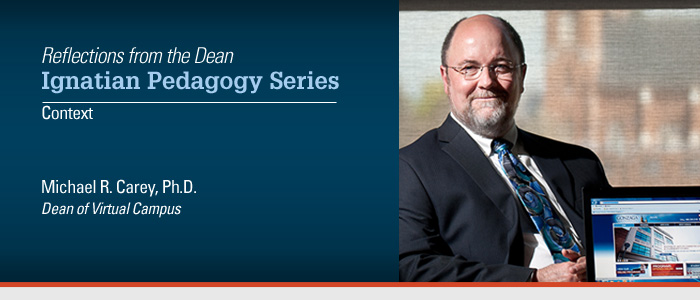Let’s discuss Context, one of the underlying dynamics of Ignatian Pedagogy. Appropriately, let’s begin by reviewing the context of how the dynamics of Ignatian Pedagogy came about in the first place. In 1983, the Society of Jesus held what is called a General Congregation, which is an assembly of Jesuit representatives from around the world. The major work of the General Congregation in 1983 was to install Peter Hans Kolvenbach as the new Superior General of the Order. For our purposes, it is also important that in the very first written decree of this General Congregation, the assembled Jesuits stated: “Based on the Spiritual Exercises the Ignatian tradition should allow a transformation of people’s habitual patterns of thought through a constant interplay of experience, reflection, and action.
Ten years later, Fr. Kolvenbach distributed a document entitled “Ignatian Pedagogy: A Practical Approach,” which was written by the International Commission on the Apostolate of Jesuit Education. It was here that the dynamics of Context and Evaluation were added to the previously identified Experience, Reflection, and Action, primarily because it was difficult to imagine an educational method not including both an understanding of the context within which the learning takes place and an evaluation of the results of the learning process. I am using this document as the source for my presentations.
So what does Context mean when applied to Ignatian Pedagogy? It means that teachers, as well as other members of the learning community, should take account of:
- The real context of a learner’s life.
- The socio-economic, political, and cultural context.
- The institutional environment of the school or learning center.
- The previously acquired concepts that are brought to the start of the learning process.
Context means that learning activities are different now than they were twenty years ago because people are different, and what they and the society need now is different. Before any learning happens, then, the first step is always an analysis of the circumstances of time and place.
In future presentations I will share some background on the other dynamics of Ignatian Pedagogy: Experience, Reflection, Action, and Evaluation.
Dr. Michael Carey
